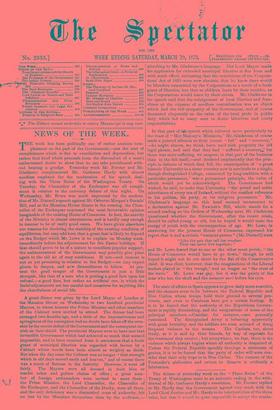A great dinner was given by the Lord Mayor of
London at the Mansion House on Wednesday to two hundred provincial Mayors, in whose honour the Prime Minister and other members of the Cabinet were invited to attend. The dinner had been arranged two Months ago, and a little of the impressiveness and springiness of the conception had no doubt been taken off the occa- sion bythe recent defeat of the Government and the consequent tar- nish on their shield. The provincial Mayors were to have met that invincible Government which had achieved so much that seemed impossible, and to have received from it assurances that a fresh grant of municipal liberties was regarded with favour by a Cabinet whose words have been almost as weighty as deeds. But when the day came the Cabinet was no longer "that strength which in old days moved earth and heaven," and of course there was a touch of flatness in the festivity. However, it went off fairly. The Mayors were all dressed in their blue or scarlet robes and golden chains of office ; a great num- ber of foreign ambassadors were invited to meet them ; the Prime Minister, the Lord Chancellor, the Chancellor of the Exchequer, and the Chancellor of the Duchy, were all there, and the only deficiency was a diminished sense of authority, felt no leas by the Ministers themselves than by the audience,—
attaching to Mr. Gladstone's language. The Lord Mayor made his application for extended municipal liberties in due form and with much effect, intimating that the restrictions of the Corpora- tions' Act of 1835 were now obsolete, that he knew there would be blunders committed by the Corporations as a result of a fresh grant of liberties, but that as children learn by their tumbles, so the Corporations would learn by their errors. Mr. Gladstone in his speech said that the enlargement of local liberties and fran- chises at the expense of needless centralisation was an object which had the full sympathy of the Government, and of course descanted eloquently on the value of the local pride in public duty which led so many men to desire laborious and costly responsibilities.






































